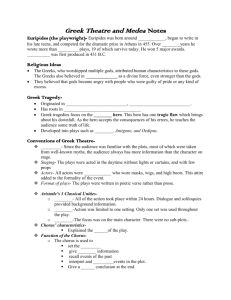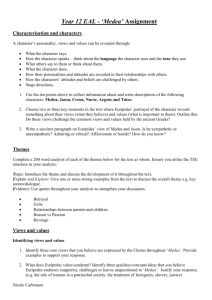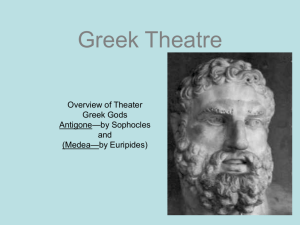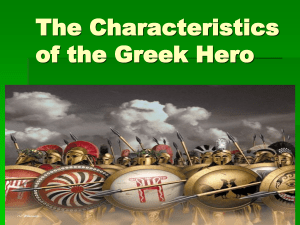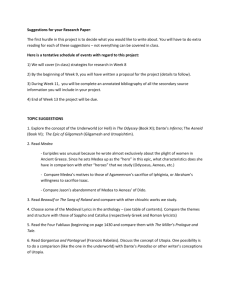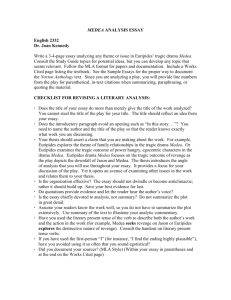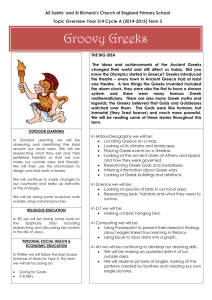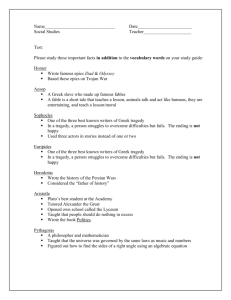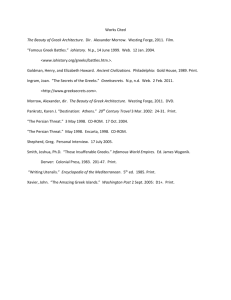Social and Political Ideas
advertisement
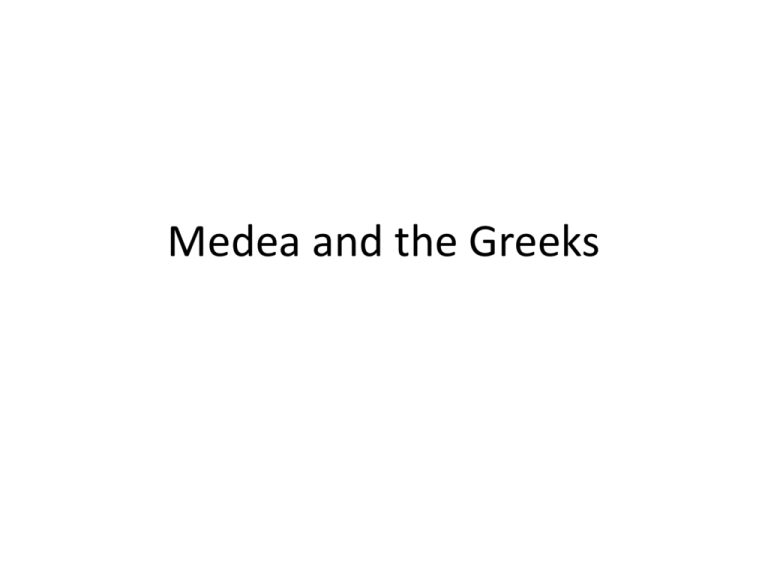
Medea and the Greeks Homework • Answer questions 1-7(top of page 20 Euripides • The fifth century B.C., a most important period of Greek drama, • Aeschylus, Sophocles, and Euripides Euripides, born in about 484 B.C., • Euripides in a span fifty years wrote more than eighty plays, nineteen of which survive today, and won five major awards. Medea was first produced in 431 B.C. Social and Political Ideas - Athens Fifth Century B.C. • this was a time of great achievements in all forms of art. • .The Athenian government of the time was an exclusive democracy run by elected officials in the form of an open assembly. • Participation in this democracy, however; was limited to only about ten percent of the population; women, slaves, and other “non-citizens” were excluded. • The world was beginning to change, however; and one of those changes involved the lowly status of women. Religious Ideas • The Greeks worshipped multiple gods, • Attributed human qualities to these gods • The Greeks also believed in fate as a divine force, even stronger than the gods. Although no one could know his/her fate, the Greeks used omens, oracles, and soothsayers to learn the will of the gods. • The Greeks felt that the gods became angry with people who were guilty of pride or any kind of excess. Origins of Greek Drama • Greeks had many religious festivals to celebrate the gods. • Drama was an important part of the religious ritual. • to honor Dionysus. • The god Dionysus suffered, died, and was resurrected. The early tragedies were in this cycle of despair followed by ecstasy of enlightenment. • These plays were choral lyrics with one actor taking several roles and conversing with the leader of the chorus between performances of the chorus. • As the theater evolved, more and more of the myths were used as the basis of the dramas. Dionysus The god of wine, and of theatre. His followers are the Satyrs and Maenads. The Satyrs are half men half goat, and the maenads are mad women(too much wine.) • Like the vines that are cut down every winter and grow anew in the spring, Dionysus represents joyful resurrection, similar to Persephone Definition of Tragedy • • • • • Homework every night! Jk The Greek tragedy focuses on the tragic hero tragic flaw which brings about his downfall. As the hero accepts the consequences of his errors, he teaches the audience some truth of life. • The people watching feel a catharsis, a heightening of emotions, as they watch the hero suffer; and they identify with his problems. I The Greek Theater • - The first theater was on the slopes of Acropolis. Now.. My one question is Shared Inquiry • Read Nurse’s monologue – How is Medea described? Use a check/post-itnote to mark lines that reveal character – ? Where you have questions Agenda • • • • • Stamp homework/ turn in at end of class Review: lines that reveal character Imagery Foreshadowing Small groups will read 21-23 answer questions on back side of SG and turn in. • P. 18 no one who makes an enemy of her will carry off an easy victory • She glares at us like the mad bull or a lioness guarding her cubs • P 18 She learns through pain what blessings they enjoy who are not uprooted from their native land. • 18she will not eat she lies collapsed in angony • P. 18: she hates her sonsto see them is no pleasure to see them is no pleasure to her. Foreshadows death Imagery: use of figurative language to make something abstract concrete • Simile: in direct comparison between two dissimilar things that share a common characteristic. (like or as) My love is like a rose • Metaphor: Direct Comparison without using like or as. (IS) My love is a rose • Where is imagery used in Nurse’s soliloquy? Foreshadowing? • • • • • Hints of future events Page 18: Some dreadfu lpurpose if forming in her mind P.20: I’ve watched her watching them, her eye like a wild bull’s. There is something she means to do. • The dark cloud of her lamentations….it will burst aflame as her anger rises. Why don’t we meet Medea right away? agenda • Check homework: read 21-23 answer questions on back side of SG and turn in. • Small group work on monologues • Read 24-29 Review homework • Question #9: Is Medea’s rage justified? groups • 1. Chorus page 22-23 what view of marriage is Euripides making clear here? And what does the chorus ask of Medea? – Find specific lines and images • 2 .What argument does Medea make in her speech about the role of womenin Greek Society? – Do you sympathize with her Find specific lines and images • 3. What argument does Medea make in her speech about the role of womenin Greek Society? – Do you sympathize with her Find specific lines and images • 4. What is the real reason why Medea begs for one more day corinth? – Find specific lines and images that reveal her intent and reveal her character. • 5. What is the real reason why Medea begs for one more day corinth? – Find specific lines and images that reveal her intent and reveal her character Agenda • Rehearse monologues • Present group 1 • Practice vocab • Test Monday: • Vocab, definition of Greek Tragedy, Greek stage conventions Themes • • • • • • Passion Greatness and Pride Position of women Exile The other Medea’s cleverness/manipulation Agenda • Finish monologues • Review vocabulary • Stage conventions and defintion of Greek tragedy • Review notes from ppt one Euripedes. Dramatic Reading Where should choral voce be used? Find words or phrases that need to be emphasized through choral voice Who will read each line? divide by sentences or thoughts Find three gestures or movements to include in your dramatic reading. hands raised backs turned people move poses Greek Tragedy 1. The Greek tragedy focuses on the tragic hero 2. tragic flaw which brings about his downfall. 3. As the hero accepts the consequences of his errors, he teaches the audience some truth of life. The people watching feel a catharsis, a Stage Conventions 1. Plays make use of dramtic irony Audience knows something that the characters don’t know. 2.Plays acted in daytime 3. Actors were males. Wore masks, wigs 4 poetic verse not prose 5. Three Unities unity of time, unity of place, unity of subject (no subplots) Messengers were used to tell audience what happened off stage. No violence shown.
